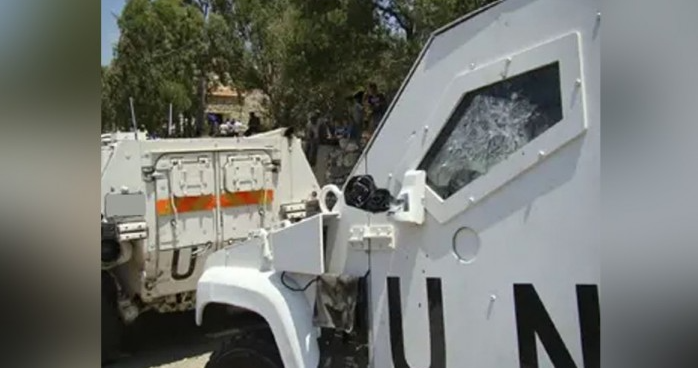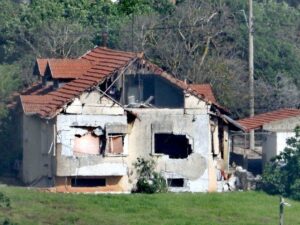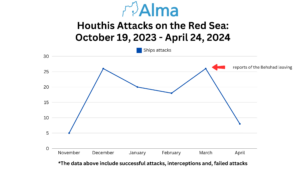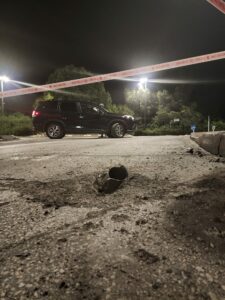Since the outbreak of war in the Gaza Strip in October 2023 and Hezbollah’s military involvement against Israel, there have been, as of this writing, three incidents in which UNIFIL forces were attacked in southern Lebanon. Attacks against UNIFIL are a recognized phenomenon that predates October 2023. UNIFIL forces were attacked from time to time in southern Lebanon, particularly when they entered regions where Hezbollah did not want them to be. In recent years, we have seen many examples of what Hezbollah does to a UNIFIL force that unintentionally or intentionally enters areas where it is not allowed to go without coordination with the Lebanese army. In such occurrences, UNIFIL forces are blocked or attacked, and sometimes its soldiers are injured and their equipment looted.
Attacks on UNIFIL forces are carried out by local residents, some of whom are Hezbollah operatives themselves, and some are sent by Hezbollah. Over time, these attacks tend to become more frequent during times of security tensions. Over time, Hezbollah has also emphasized the idea that UNIFIL forces cooperate with Israel by giving it intelligence.
These are tactical incidents, but they are also phenomena that hold predictive power for the future. This phenomenon begs the following question, which is not tactical: What sort of foreign power can impose a diplomatic or political agreement in southern Lebanon?
Unfortunately, UNIFIL forces will not be able to move where Hezbollah does not want them to move. UNIFIL’s freedom of action and movement will be very limited, which in any case will not allow the force to exercise its mission or authority.
Any attempt by UNIFIL or any other international force to impose a political agreement to redeploy Hezbollah or the Radwan unit north of the Litani will result in a violent conflict and the international force’s loss of life. Are the participating countries or those who will join such a force prepared for this?
As previously mentioned, there have been three incidents against UNIFIL since the start of the conflict in the Gaza Strip: in the towns of Rmadiyeh, Taybeh, and Kafar Kila.
On November 9, a UNIFIL patrol entered the inner neighborhoods of the town of Rmadiyeh unaccompanied by a Lebanese army patrol, causing residents to block their way and develop into a violent brawl. The residents accused the patrol of “looking for Hezbollah positions in order to convey the information to Israel so that it can attack.”
On December 27–28, UNIFIL forces were attacked twice in less than 24 hours. These were French and Indonesian forces. One UNIFIL soldier was injured.
On the evening of December 27, a UNIFIL force was attacked by a “group of youths” in the town of Taybeh. As a result, a UNIFIL soldier was injured.
On December 28, a “group of youths” from Kafar Kila blocked a UNIFIL patrol from the French battalion passing through the town, forcing it to retreat after hitting the force’s vehicle with an iron rod.
Candice Ardil, deputy director of UNIFIL’s information office, later announced that “at around nine o’clock in the morning, the peacekeepers were detained for about four minutes while passing through KafarKila while on their way to their headquarters in the eastern sector.” “After a brief discussion with the residents of the area, the peacekeepers continued on their way.” Ardil added, “We continue to emphasize the importance of UNIFIL’s freedom of movement as we work to restore security and stability in southern Lebanon.”
Ardell called on the Lebanese authorities to “open an investigation into the incident and prosecute all those responsible for these crimes,” stressing that “UNIFIL peacekeepers continue their missions and core work in monitoring and de-escalation… Attacks on men and women serving the cause of peace are not only reprehensible but also a violation of UN Security Council Resolution 1701 and Lebanese law.”
In conclusion, UNIFIL is an irrelevant body in terms of political and diplomatic agreements. Although it has 10,000 soldiers, “thanks” to Hezbollah, it has no military influence on what is happening in southern Lebanon today; it has had no influence in the past (except for civilian assistance to the population), and it will have no military influence in the future as well.
Even if the wording of Resolution 1701 is changed and UNIFIL’s mandate is strengthened, UNIFIL will also be defined as the enforcer of the resolution and not only as assisting (the Lebanese army) in enforcing it, it will remain in practice irrelevant.
Hezbollah will take care of that.






